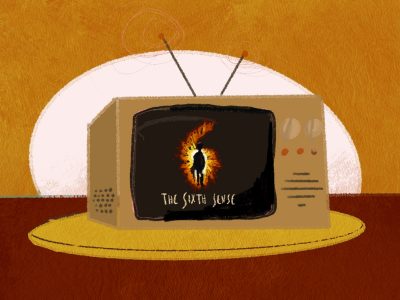“The Sixth Sense,” a movie from incredible director M. Night Shyamalan, is quite the emotional rollercoaster with different twists and turns throughout the film. However, the biggest twist of all comes at the end, and is often considered one of the finest surprise endings of any Hollywood film — and the ending that made Shyamalan legendary.
When watching the movie back a few weeks ago, I couldn’t help but wonder if I should have seen this ending coming. Or, for that matter, if the entire audience should have seen it coming. From this point forward, expect major spoilers, reader discretion is advised.

Finding out that Dr. Malcolm Crowe, played by Bruce Willis, was dead the entire time he was working with Cole Sear, played by Haley Joel Osment, came as quite the shock to me the first time I viewed this movie five years ago.
Shyamalan was able to masterfully craft the story in a way where we see the world through Dr. Crowe’s eyes, only seeing what he wants to see, and not knowing he is dead the entire time. But, if one watches the movie closely enough, there are a few very obvious clues that indicate the ultimate ending for Dr. Crowe.
Let’s take a look at different moments throughout the film that could, if one watches closely, give away Shyamalan’s masterful twist ending
First, there is the opening scene when Dr. Crowe gets shot by his former patient, Vincent Grey. Surviving a gunshot wound to the abdomen is extremely difficult, but definitely plausible if the correct conditions are there. This indicates that Dr. Crowe could easily be both dead or alive, depending on the condition he was in after he was shot.
However, it begins to get more obvious that Dr. Crowe is dead as we move through some additional scenes. When he first meets Cole, Cole runs away very quickly, looking quite fearful. This is in line with his fear of the ghosts whom he faces.
But, Cole seems to quickly calm down when Dr. Crowe finds him in the church and they begin their therapeutic relationship, again throwing the audience off.
The next sign is the interactions Dr. Crowe has with the rest of the world outside of his relationship with Cole. While there are a few tricky moments where it seems as if Dr. Crowe is interacting with others besides Cole, after a while it becomes noticeable that none of these interactions are actually happening.
Yet still, there are enough details to throw off the audience, like the fact that Dr. Crowe sits next to Cole’s mom, although there is no conversation, and then he goes to his anniversary dinner and speaks to his wife, yet she does not speak back.
There is also the issue of the door: We never see Dr. Crowe manage to get open, only seeing him struggle to open it before he is suddenly in the basement. This could just be written off as Shyamalan not bothering to show him finally get the door open, only at the end do we see the table in front of the door.
The real answer to the question whether the audience should have known the ending from clues in the movie is that even to someone with an above average ability for observation, Shyamalan created an environment where it was almost impossible to figure out that Dr. Crowe was dead the entire time. However, it is still possible, when observing closely, to figure it out.
The more important point here is, regardless of if one should have known Dr. Crowe was dead the entire time he was working with Cole, one should not want to know.
There is a magic to watching this movie and feeling not only the emotion that comes with every viewing of the film, but experiencing that surprise ending and having your heart skip a beat when everything finally becomes so clear.
The movie is most certainly enjoyable to watch even if you do know the ending, but that first viewing is special in a way that almost no other movie can emulate, specifically because one does not know the ending on first viewing.
The journey this movie takes the viewer on will always be spectacular. I know that after watching this movie many times and knowing the ending. But this is one of the few times in life where the whole idea of “it’s the journey, not the destination” can be challenged.
Shyamalan’s destination in “The Sixth Sense” is truly a spectacular one, and one where it would be a true shame if someone tried to figure it out before they got there. Enjoy the journey throughout the film by fully immersing yourself in the life of Dr. Crowe and Cole and not trying to guess the end. This will make not only the journey, but especially the destination, all the more worthwhile.


























































































































